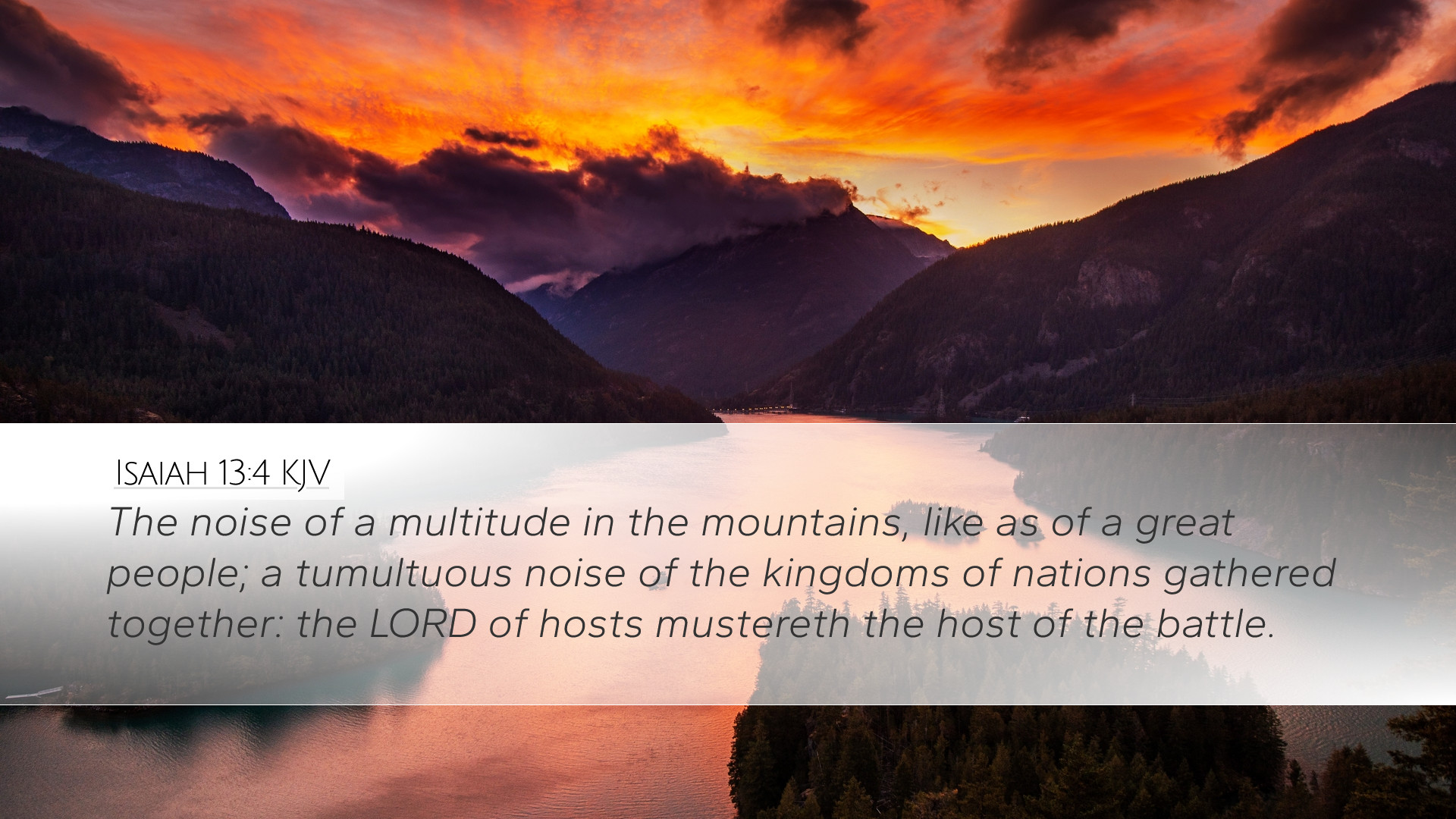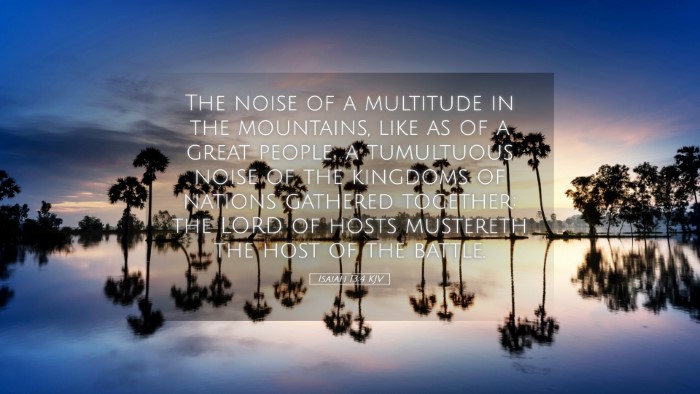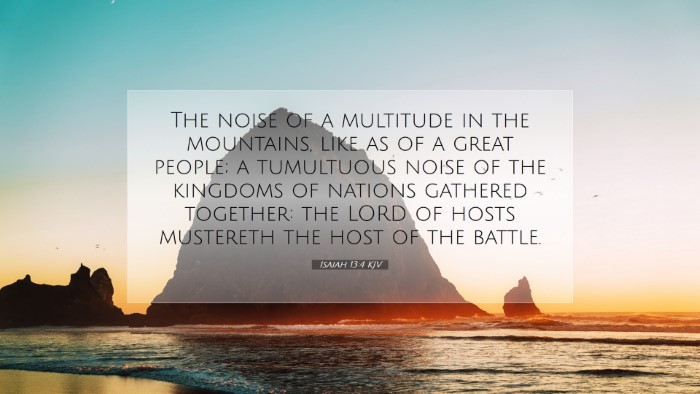Commentary on Isaiah 13:4
Verse: "The noise of a multitude in the mountains, like as of a great people; a tumultuous noise of the kingdoms of nations gathered together: the Lord of hosts mustereth the host of the battle." (Isaiah 13:4)
Introduction
The prophecy contained in Isaiah 13:4 marks a pivotal moment in the book of Isaiah, where the divine judgment upon the nations is pronounced. The text communicates not only a message of warning but also one of hope as it emphasizes God’s sovereignty over all nations. Below is a detailed commentary drawing insights from public domain scholars like Matthew Henry, Albert Barnes, and Adam Clarke.
The Contextual Framework
To fully understand this verse, it is essential to consider its immediate context within the prophetic message of Isaiah. This prophecy is directed towards Babylon, a nation symbolic of pride and opposition to God’s purpose.
Historical Background
Babylonian power rose to prominence during Isaiah's era, representing not just a geographical location but also a cultural and spiritual adversary to God’s people. Isaiah depicts the impending judgment upon Babylon, illustrating how the noise of multitude signifies the chaos and destruction foreseen.
Verse Analysis
The Noise of a Multitude
According to Matthew Henry, the "noise of a multitude" suggests the clamor and uproar that accompanies armies preparing for war. It echoes the dread that accompanies impending judgment, signifying that even the mightiest powers are under God's authority. The term 'multitude' alludes to the vast number of troops gathered, reflecting the human tendency to rely on physical strength rather than on divine support.
Mountains as Symbols
Albert Barnes informs us that mountains often represent strength and stability in biblical literature. Here, they symbolize the forces of nature and the might of empires. Their mention serves to heighten the image of a great upheaval where the stability of nations is questioned under God’s scrutiny. The 'mountains' can also signify high places where nations gather their strength, yet ultimately their rebellion against God leads to divine judgment.
Gathering of Nations
Isaiah recounts a coalition of nations underlining the international aspect of the divine judgment. Adam Clarke emphasizes that this gathering indicates a global scene where various kingdoms unite against God’s will, yet ironically, their very assembling becomes a precursor to their own demise as they are 'mustered' for battle by the Lord.
The Lord of Hosts
The phrase "the Lord of hosts" is significant as it denotes God's supreme authority over all heavenly armies and earthly rulers. Henry highlights that this title reaffirms that whatever alliances are formed on earth, it is the divine will that dictates the outcomes.
Divine Sovereignty in Warfare
This verse also encapsulates a theological foundation concerning divine sovereignty in warfare. The Lord "mustereth the host of the battle," presenting a cosmic view where God orchestrates events and gathers judgment against nations that oppose Him. Barnes suggests that this 'muster' is emblematic of God’s careful preparation for judgment, which serves both as a warning and a reminder of His control over history.
Practical Applications
The Assurance of Judgment
For pastors and theologians, this passage serves as a stark reminder of God’s righteous judgment. In times when humanity seems to rise against divine principles, believers can find comfort in knowing that God is ultimately in control. His judgment, though often delayed, is sure and just.
The Call to Repentance
The cacophony of nations prepares for battle, and yet it calls the faithful to introspection. Clarke points out that understanding this divine orchestration urges both individuals and communities to seek repentance, aligning their lives with God’s commandments before the time of reckoning.
Trusting in God’s Sovereignty
In practical terms, Isaiah 13:4 can encourage believers to trust in God’s sovereign plan amidst chaos and strife in the world. Even in the tumult of nations, His purpose remains unshaken. Pastors can utilize this insight to preach hope and resilience rooted in faith during troubling times.
The Summary of Key Themes
- Divine Judgment: Illustrates the certainty of God’s judgment against prideful nations.
- Sovereignty of God: Affirms that God orchestrates the events of human history.
- International Conflict: Depicts the complexities of geopolitics under God’s authority.
- Call to Repentance: Encourages reflection and realignment with divine principles before impending judgment.
- Hope in Divine Oversight: Provides encouragement for believers to find peace and trust in God’s ultimate control.
Conclusion
Isaiah 13:4 encapsulates profound truths regarding divine authority and the inevitable judgment that awaits those who rebel against God. Drawing from the insights of esteemed commentators like Matthew Henry, Albert Barnes, and Adam Clarke, it is evident that this scripture presents a multifaceted understanding of God’s relationship with nations and His people. For pastors, students, and theologians, it remains a crucial text for exploring the themes of judgment, sovereignty, and the assurance of God’s control over history.


